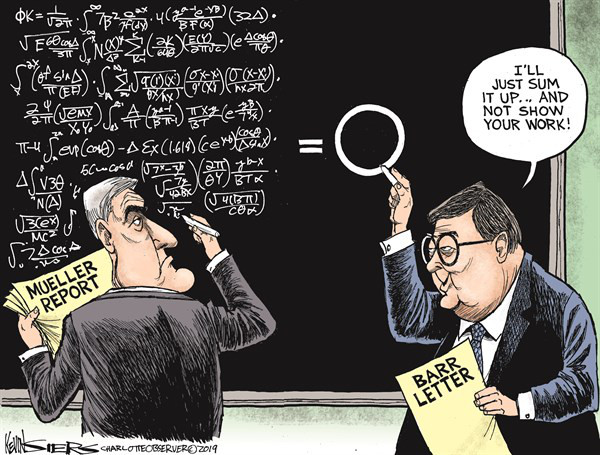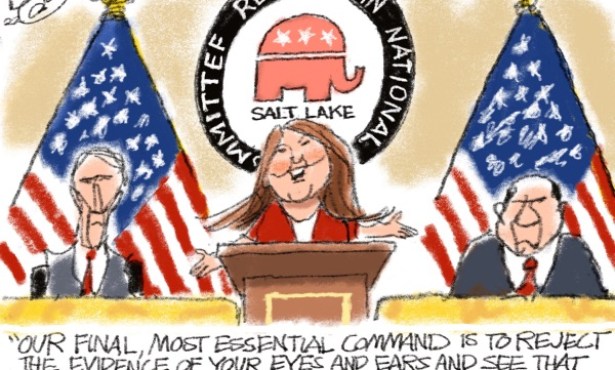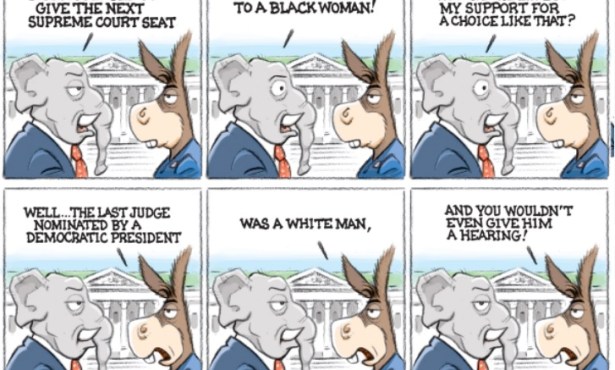Mueller Report Must Be Released to Congress
It's Not the Last, but Should Be Made Public

In the wake of Attorney General Barr’s summary of the Mueller report we have seen President Trump, and his supporters, who for the last two years have repeatedly characterized the investigation as a “hoax and witch hunt,” turn around and use the attorney general’s summary of the report as a complete vindication of any and all claims that the president either conspired (colluded) with the Russians or committed obstruction of justice. According to the attorney general’s rendition, the report was not a total vindication of the president’s conduct.
Americans should be relieved that the Special Council did not find evidence that our government conspired (colluded) with the Russian Government. At the same time, we need to demand that the entire Mueller report, at the earliest possible time, be turned over to the appropriate congressional committees investigating President Trump and his administration.
According to Attorney General Barr’s recitation of what is in the report, the special counsel concluded that that the Russians conducted disinformation and social media operations to “sow social discord … with the aim of interfering with the election,” along with “computer hacking operations” of the Clinton campaign designed to “gather and disseminate information to influence the election [in favor of Donald Trump].”
Congressional committees are investigating counter-intelligence concerns related to Russia and the 2016 election, along with efforts by Russia to influence the U.S. political process during and since that election. Given President Trump’s denial of that intervention in our electoral process in Helsinki and since, and his having lied about being in negotiations to build a Trump Tower in Russia during the election, these committees need to have unfiltered access to all of the Russia data and evidence developed by the special counsel.
The Congress is also investigating whether the president obstructed justice. On this issue the president cannot have it “both ways.” He cannot praise and embrace the report for vindicating him regarding conspiracy while at the same time deny that the report did not “exonerate” him from having obstructed justice. It was the Trump-nominated attorney general (AG) who did the “exoneration.”
According to the AG’s letter, the report does not “exonerate” the president on this issue. Rather, “it sets out evidence on both sides of the obstruction question and leaves the issue unresolved” (presumably because the special counsel was equivocal about establishing the criminal burden of proof — “beyond a reasonable doubt”). In the face of this “not one way or another” conclusion, the Trump-appointed attorney general, who prior to his confirmation criticized the Mueller investigation, took it upon himself to conclude “that the evidence developed during the investigation is not sufficient to establish that the President committed an obstruction-of justice offense.”
Prior to his confirmation, Attorney General Barr voluntarily presented the White House with a 19-page memo, addressed to Deputy Attorney General Rod Rosenstein, arguing against prosecuting the president for obstruction of justice. This pre-judgment of the investigation calls the AG’s conclusion into question, and it requires that all of the obstruction data and evidence be released to that committee (House Judiciary) which would consider impeachment of the president.
President Clinton was impeached by the House of Representatives for obstruction of justice (and perjury) under the “high crimes and misdemeanors” criteria in the Constitution. Keeping in mind that impeachment is a political process which does not require “proof beyond a reasonable doubt,” if a president can be impeached over a sexual affair (which Trump has also lied about), he can certainly, depending on the evidence, be impeached for intervening in an FBI investigation into his and his administration’s conduct. That evidence is in the Mueller report. The AG’s interpretation of it should not be allowed to stand without a through and transparent investigation of it by the House Judiciary Committee.
The Mueller report, which was limited to criminal prosecutions related to Russia, is not the end all of Trump investigations. In addition to Mueller and on-going Congressional investigations, there are at least 12 other Trump investigations that could constitute a “high crime and misdemeanor.” These among others, includea campaign finance extramarital hush money felony investigation that has already indentified the president as an unindicted co-conspirator (with Michael Cohen); Trump inaugural funding; the Trump Foundation’s misuse of funds; Trump’s taxes; misrepresentations of wealth to banks; and his golf clubs employing undocumented immigrants.
All of the data and evidence developed in these investigations should at appropriate times be shared with Congress. The appropriate time for sharing the Muller investigation is now.



